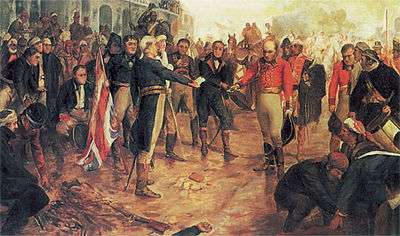Anglo-Spanish War (1796–1808)
| Anglo-Spanish War | |||||||||
|---|---|---|---|---|---|---|---|---|---|
| Part of the French Revolutionary Wars and the Napoleonic Wars | |||||||||
 La Reconquista de Buenos Aires: Beresford surrenders to Santiago de Liniers, by Charles Fouqueray. | |||||||||
| |||||||||
| Belligerents | |||||||||
|
1796–1802: 1804–1808: |
1796–1801: 1801-1802, 1804-1808: Supported by: | ||||||||
| Commanders and leaders | |||||||||
| Strength | |||||||||
|
38 ships of the line (1796) 70 ships of the line (1805) 200,000 (1801) 50,000 (1807) |
100+ ships of the line [1] 80,000 (1801) 50,000 (1807) | ||||||||
.jpg)
The Anglo-Spanish War was a conflict fought between 1796 and 1802, and again from 1804 to 1808, as part of the French Revolutionary Wars and the Napoleonic Wars. The war ended when an alliance was signed between the UK and Kingdom of Spain, which was now under French invasion.
In the War of the First Coalition, Spain declared war on the newly formed French Republic, joined the Coalition in attempting to restore the Bourbon Monarchy. The main Spanish general was the brilliant Antonio Ricardos, but even he failed to secure a decisive victory, despite initial successes. French forces elsewhere quickly overran the Austrian Netherlands after the Battle of Fleurus, and the Dutch Republic collapsed under huge pressure. The Spanish were having similarly bad times. The Spanish navy did little, with the exception of combing with the British and therefor participating the Siege of Toulon.
Following the Battle of the Black Mountain, the French Republic gained a huge advantage, and by 1795, the Peace of Basel was signed, forcing the Kingdom of Spain and Kingdom of Prussia to exit the Coalition. in 1796, encouraged by massive French gains in the Rhine Campaign and Italian Campaign, Manuel Godoy signed the Treaty of Ildefonso, establishing a Franco-Spanish alliance and common war against Great Britain. The hope was that victorious France would also win over land and money for Spain.
The war was a disaster for the once mighty Spanish Empire, with the British blockading trading ports, preventing large amounts of wealth from the colonies from arriving. Unlike in the American Revolutionary War, Spain could do little against the substantial amounts of debts gained. A main Spanish fleet, under Jose de Cordoba y Ramos, had 27 ships of the line, however, and planned to link with the French and protect coveys of valuable goods. The British Mediterranean fleet had 15 ships of the line - heavily outnumbered by Franco-Spanish threats, forcing a retreat from Corsica and Elba by 1797.
The Spanish fleet was docked at Cartegna, with the French at Brest.
The Treaty of Amiens in 1802 provided for a temporary truce in hostilities, only to be broken in 1804, when, as part of the reopening of the war with Napoleons France, the British captured a Spanish squadron of frigates carrying gold bullion to Cádiz. The French planned an invasion of England in the coming year; the Spanish fleet was to be an integral part in assisting this invasion. At the Battle of Trafalgar, in 1805, a combined Franco-Spanish fleet, attempting to join forces with the French fleets in the north for the invasion, were attacked by a British fleet in one of history's greatest naval engagements. The decisive British victory ended Napoleon's hopes of an invasion of Britain. It seriously shook the resolve of the unpopular Spanish government, which began to doubt the utility of its uncertain alliance with France. Meanwhile, a British campaign (1806–1807) to conquer the strategically important Rio de la Plata region in South America met with failure.
Godoy withdrew from the Continental System that Napoleon had devised to combat Britain, only to join it again in 1807, after Napoleon had defeated the Prussians. Napoleon, however, had lost his faith in Godoy and King Charles; there was also growing support in Spain for the king's son, Ferdinand, who opposed the widely despised Godoy. Ferdinand, however, favoured an alliance with Britain, and Napoleon had always doubted the trustworthiness of any Bourbon royalty.
In 1807, France and Spain invaded Portugal, and, on 1 December, Lisbon was captured with no military opposition. In the beginning of 1808, the French presence in Spain was so predominant that it led to revolt. Napoleon then removed King Charles and his son Ferdinand to Bayonne and forced them both to abdicate on 5 May, giving the throne to his brother Joseph. This led to the Peninsular War and the de facto end of the Anglo-Spanish War, as George Canning, foreign secretary of His Majesty's Government, declared:
- "No longer remember that war has existed between Spain and Great Britain. Every nation which resists the exorbitant power of France becomes immediately, and whatever may have been its previous relations with us, the natural ally of Great Britain." [2]
Notes
References
- Foy, Maximilien Sebastien (1827). Histoire de la guerre de la Peninsule sous Napoleon. III.